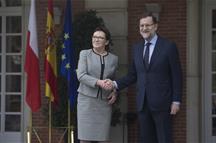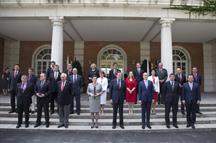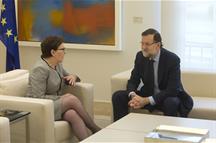Rajoy: "There will be no independence in Catalonia, there simply won't"
President's News - 2015.7.16
1. Images of the 11th Spain-Poland Summit | Pool Moncloa - 2015.7.16
Moncloa Palace, Madrid
At the press conference given by the two politicians, in response to the questions from journalists about the announcement of a single list in Catalonia to announce its independence in six months, the head of government answered that "the State is fully prepared to ensure the law is complied with when someone breaks it."
He explained: "There will be no independence in Catalonia, there simply won't. I also want to say that Catalonia won't leave Europe - because that is what is being proposed to the citizens of Catalonia. It is precisely that: to leave Europe."
Mariano Rajoy argued that the elections to be held in Catalonia are regional, so the only things that can be chosen are deputies and a regional parliament: "Nothing else is chosen or decided there." In addition, he insisted that the Government guarantees all the Spanish people that it will ensure compliance with the law: "The law will be complied with in Catalonia and anywhere else in Spain."
The Spanish head of government added that some leaders should learn from the crisis in Greece when they promise or offer things that in practice will end up nowhere: "I believe that leaders should act responsibly, with prudence and common sense, knowing what they can do and knowing what they can't."
He explained that the Government will guarantee that "the law will be complied with in Catalonia and no one will force any citizen to choose between being Catalan, Spanish and European." He added that "Spain is one of the great democracies in the world and in a democracy there are laws and the rule of law."
Greece can emerge from the crisis
 Pool MoncloaThe President of the Government and the Polish Prime Minister addressed a number of issues, including the situation in Greece. Mariano Rajoy expressed his confidence that "after more than five months during which the incipient recovery and the trust of its European partners has broken down, the agreement reached on Monday will be complied with." In his opinion, the lesson is clear: "Construction requires time and effort, while destruction is very quick." And the priority now is "to recover lost confidence and return to growth and employment."
Pool MoncloaThe President of the Government and the Polish Prime Minister addressed a number of issues, including the situation in Greece. Mariano Rajoy expressed his confidence that "after more than five months during which the incipient recovery and the trust of its European partners has broken down, the agreement reached on Monday will be complied with." In his opinion, the lesson is clear: "Construction requires time and effort, while destruction is very quick." And the priority now is "to recover lost confidence and return to growth and employment."
"I believe that we are faced with one of the last opportunities, but Greece can emerge from the crisis, despite what some people think, and it can grow and create jobs," if things are done well, he explained.
The President of the Government said that it is possible to achieve the goal of "Greece moving forward, growing, creating jobs, and people living better," but insisted that "European solidarity must be accompanied by responsibility in the decisions that are adopted."
In his opinion, the first step that Greece has to take is to arrange the bridging loan because on 20 July a debt with the European Central Bank is due to be repaid, and if Greece does not pay it would go bankrupt, which is what has to be avoided.
In addition, the Greek government has to agree, as soon as possible, a programme with the European Central Bank, the International Monetary Fund, and the European Commission to begin to receive the 82 billion euros promised in successive payments in exchange for a policy of reforms and fiscal consolidation. According to the President of the Government, this programme could be approved between 12 and 25 August. At the same time, Greece has to comply with the programme so that the situation of its economy improves, and because if it does not, it will not receive funding.
Reformist, moderate and pro-European policies
 Pool MoncloaMariano Rajoy highlighted that the Spanish-Polish summit today is the fourth in the last four years, and that both countries are working "in close contact", both bilaterally and within the European Union.
Pool MoncloaMariano Rajoy highlighted that the Spanish-Polish summit today is the fourth in the last four years, and that both countries are working "in close contact", both bilaterally and within the European Union.
"Relations between Spain and Poland have never been stronger, because never before have two of the oldest and largest nations in Europe had so many common interests, and above all, never have they managed them so closely and in a spirit of ongoing commitment and cooperation as we are doing now," he explained. At the same time as the meeting between Mariano Rajoy and Ewa Kopacz, specialised meetings were held on Foreign Affairs, Justice, Public Works, Economy, Trade and Agriculture.
The President of the Government added that neither Spain nor Poland was able to form part of the birth of the European Communities, "but both countries are now key players in the present, and above all, in the future of the European project."
Mariano Rajoy stressed his agreement with the Polish Prime Minister on economic policy and with respect to the future of the EU. "Reformist, moderate and pro-European policies are a guarantee for recovery, sustainable growth and job creation," he indicated. In his opinion, they allow "a strengthening of the basic pillar of the European model: the Welfare State," and explain how "Spain and Poland can be leading European growth in 2015."
European immigration policy
 Pool MoncloaAs well as the situation in Greece, the two leaders have dealt with important issues on the European agenda, such as the referendum on British membership of the EU and immigration policy. With respect to the latter, said Mariano Rajoy, the governments of Spain and Poland share the idea that it must be tackled "from a global perspective, in dialogue and cooperation with the countries of origin and transit, and not with incomplete solutions."
Pool MoncloaAs well as the situation in Greece, the two leaders have dealt with important issues on the European agenda, such as the referendum on British membership of the EU and immigration policy. With respect to the latter, said Mariano Rajoy, the governments of Spain and Poland share the idea that it must be tackled "from a global perspective, in dialogue and cooperation with the countries of origin and transit, and not with incomplete solutions."
Within the scope of international policy, Mariano Rajoy and Ewa Kopacz analysed the situation in Ukraine. The solution, according to the President of the Government "can only be political, based on the Minsk agreements." It must respect the territorial integrity and sovereignty of Ukraine and be combined with an "appropriate decentralisation, which is a condition for the political integration of the eastern region." He recalled the victims of the attack on flight MH-17, a year ago on Friday, and insisted that "Spain and Poland are working to ensure that those responsible will be brought to justice."
Mariano Rajoy and the Polish Prime Minister also talked about the fight against jihadism and the NATO Summit, which will be held in Warsaw in 2016. Furthermore, they agreed that Libya needed "a political and negotiated solution with the mediation of the United Nations." Mariano Rajoy concluded that "the initial agreement signed on Saturday is a step in the right direction."





